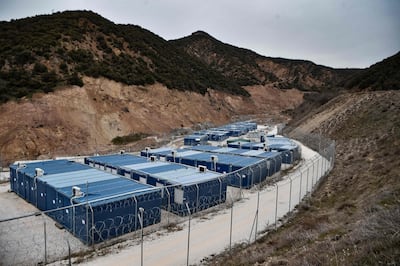Live updates: follow the latest news on Russia-Ukraine
Greek authorities have prepared a shipping-style container camp for those arriving from Ukraine near the Bulgarian border, mirroring the sprawl of temporary housing facilities that emerged across parts of Europe during the last large-scale refugee crisis in 2015.
More than 4,600 refugees from Ukraine have reached Greece since the Russian invasion, including in excess of 1,400 children.
They are among more than 2 million people who UN data show have fled the war, the majority of whom have gone to neighbouring Poland.
Greece’s Migration Minister Notis Mitarachi told local media that “as a rule” arriving Ukrainians were staying with family or friends, but that authorities have prepared a container camp that previously housed migrants for short-term accommodation.
Most of those arriving in Greece from Ukraine come through the Greek-Bulgarian border crossing of Promachonas, where Ukrainian consulate staff are helping to issue registration documents to those without passports.
The container camp is about 5 kilometres from the border and can accommodate arrivals for a few days. Camp employees said a few dozen people had stayed there so far, before moving on to stay with people they knew.

Reports abound of civilians opening their homes to receive people fleeing the war, but as the number of people fleeing Ukraine steadily rises, attention is likely to turn to where they will stay long-term.
Last week the European Commission announced at least €500 million (543m) of additional EU funding for humanitarian aid to provide food, water, health and shelter to refugees.
There are already about 25,000 Ukrainians living in Greece and a sizeable ethnic Greek community of about 100,000 people live in Ukraine. Most of this Hellenic minority live in Donetsk Oblast and around the city of Mariupol, which is currently under siege by Russian forces.
The migration ministry has said that the country can accommodate 30,000 people from Ukraine and that thousands of beds were immediately available in unoccupied migrant camps in the north of the country. Mr Mitarachi said that with EU funding, Greece would also be able to provide hotel accommodation.
The Mediterranean country is already home to about 120,000 refugees and asylum seekers, many of whom began arriving five years ago after fleeing violence in the Middle East and South and Central Asia, and who viewed it as an entry point to Europe.
However, refugee and human rights organisations have repeatedly sounded the alarm over Greece’s treatment of migrants, who often remain stuck in a “holding pen” waiting for asylum in reception centres on islands in reportedly squalid conditions.
Last month, the UN agency for refugees expressed concern at “recurrent and consistent reports” of illegal "pushbacks" at Greece’s land and sea borders with Turkey.
Mr Mitarachi’s declaration last week in the Hellenic Parliament that Ukrainians are the “real refugees” was criticised by Human Rights Watch for its suggestion that people fleeing “devastating conflict and persecution in Afghanistan, Syria, and other countries who are coming to Greece are not.”
“Greece is right to show solidarity with refugees fleeing Ukraine. But this moment should prompt a fundamental shift in Greece’s approach to dealing with people fleeing similar conflicts in other parts of the world and an end to Greece’s violent and abusive border polices that put refugees in harm’s way,” said HRW researcher Eva Cosse.


